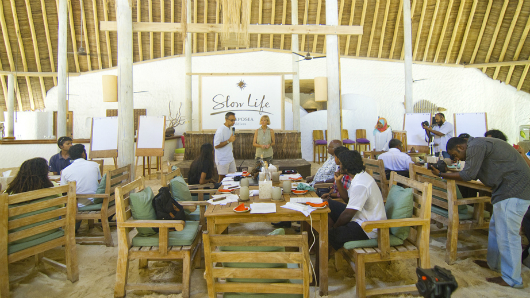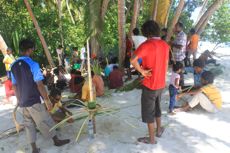They say women of any language, culture or religious background share a certain kinship. As a Westerner who has travelled in a variety of places, I have rarely been more mystified by my female peers than in the Maldives.
The Maldives is 100 percent Muslim, with a growing penchant for the burqa. A recent United Nations review of the Maldives found gender equality notably low. Many women hold or would like to hold jobs, while others opt for hijabs and house-wifery. Technically, everyone has a choice. But do they make it in reality?
Many Westerners visit the Maldives for tourism or work. Most visit resorts exclusively, but a handful make their way to Male’ or local islands. Given local cultural standards it should be no surprise to anyone that the foreign woman’s experience in the Maldives is unique. And not just dress code – behavior seems a class unto itself.
While staying on a local island recently I was regularly attended by a flock of young women aged 15-20. Their hospitality was impressive, but at times bordered on intimidating. Walking two blocks home from the beach by myself in broad daylight required a level of assurance to my hosts that was almost aggressive. Arriving somewhere alone surprised and even offended my young hostesses. While I took pictures and clapped along during festivities, walking about as I normally would anywhere, they would spend the time searching for me rather than enjoying the celebration.
Moving in public areas could be difficult as my virtual size was magnified by about three other bodies moving in sync. Several times I would turn at the sink when washing my hands to find a girl had followed me from the eating area because – well, I’m not sure. The place was only so big.
I can’t say if young Maldivian women are unfamiliar with independence, but I can say that this foreigner was befuddled by the level of dependency assumed of her person.
The feeling was neither simple nor justified. I had come to experience local culture – who was I to dictate its terms? Hospitality is meant as a compliment, so why was I so frequently frustrated by my caretakers’ intense caretaking?
My reactions came from the core, so I considered the features.
I walked to school alone at the age of 7, and was free to do anything in or out of doors from age 10 so long as it didn’t involve a trip to the hospital or police station. I accept the consequences of my own actions and deal with my own problems. And I simply aim to cause the least disturbance to those around me. This is a fairly standard upbringing for most Westerners. But its collision with the Maldivian method appears brutal on two points: independence and equality. To be so closely, at times aggressively, attended insulted my independence and aggravated a feminist side I didn’t even know I had.
From a practical standpoint, the reception also complicated rather than facilitated my interactions. As suggested by this article’s opening line, I was curious to meet and learn about local girls and women. But bound by hospitality and its assumptions of dependency, my hostesses were at times difficult to truly reach. I feared their company was based on a need to guarantee that I was never alone or asked to do anything, rather than my personal qualities. My mere presence rendered them dependent as well – if I moved to wash my hands they had to escort me. Yet as a visitor, I wanted to know their culture as it stood alone. What was daily life? What would they do without me around? What did they honestly think of me, anyway? Under the dictates of hospitality, this was nearly impossible.
Some girls willingly shared their musical preferences or accounts of village life. We had some nice chats about their schools and families. Many conversations, however, fizzled at the same point: choice.
During a bodu-beru performance a flock of young girls in hijabs urged me to dance. There were no women on the floor, so I asked someone to join me. I wanted to be sure that I wasn’t imposing, that my participation was appropriate.
“Oh no, we don’t dance, we can’t!” Why not? “We just can’t!” Too shy? “No….we have this!” The burqa. Or hijab. “You should have come two years ago, I was always dancing! But then I took up this, and you know, things changed.”
If the hijab is a fashion statement as some girls allege, then I can judge these girls in terms I would also use for Westerners whose stilettos, skinnies or furs prevent them from running, eating or holding their dribbling child, or whose nails and false eyelashes, allegedly applied to fetch a man, could also shred his scalp. Why do you build your own cage?
But if these young ladies truly accept the many meanings of wearing a hijab and the lifestyle it endorses, then – can I argue? Where is my place in the debate? I am indeed foreign.
I can, however, go dance with a girl who is not wearing religious attire, be joined by a few of younger burqa’d girls as well as the entire female population too young to start the lifestyle, and then smile afterwards when older women grab my hand saying “Shukriya!” that I, a female, danced. Apparently, they all used to, and apparently, they all enjoyed it.
I’ve asked girls why they take up the burqa or hijab. Most respond with shrugs, sideways smiles, confused looks, or explanations like, “It’s, you know, I have many friends who have so it made sense,” or “Well, I just like it but also it seems right.”
As an educated Westerner I’ve been trained not to accept “it seems right” as an answer, and my national curriculum instructed against peer pressure. But this isn’t the West, and I have to accept the local consensus. So, the conversation stops.
And with it, the connection. Our fundamental natures are opposed. I walk alone; they believe it inappropriate. I dance; they’d rather wish they could. These are only basic physical movements, but the differences are profound. Though welcomed on the island I felt alienated by my independence, and though invited into events I felt my race excused my gender and justified my in-congruency. I came to visit, not to be served – the reality frustrated my young Western curiosity.
I’ve studied Islam and its history at the college level, have several friends who practice the faith, and have lived in Muslim regions. I have always been accepted, respected, and welcomed into the fold. I have enjoyed open, free discussions with these friends on a range of topics. I think there are many beautiful aspects to the religion.
Yet in the Maldives I have not yet met a woman who can talk candidly or objectively about the Qur’an. In my country, questions and criticism lead to deeper understanding, but here this rhetoric is shunned as base opposition. Acceptance, not choice, is the cultural undercurrent. Acceptance of my hosts’ duty to the Guest, rather than an assessment of me, the Guest, as a person, governed my visit on the island as well.
Culture shock is funny concept. Though standard teachings describe a four-week rollercoaster to normalcy, experienced travelers might note that they are jarred even after a year’s stay in a foreign culture. Is it ever fair to call something right or wrong? Perhaps we can only admit our differences.
All comment pieces are the sole view of the author and do not reflect the editorial policy of Minivan News. If you would like to write an opinion piece, please send proposals to [email protected]
Likes (0)Dislikes
(0)Dislikes (0)
(0) 


